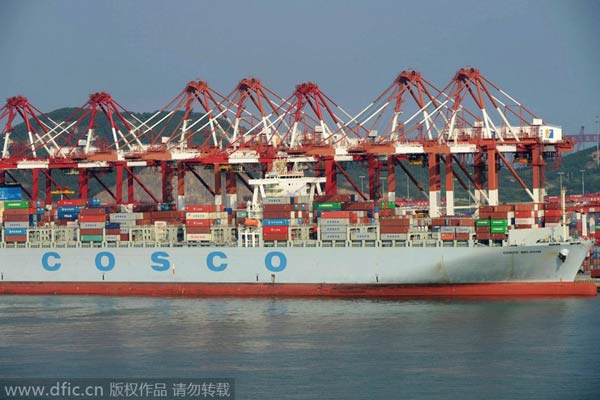No alarm in Greece's port U-turn
Updated: 2015-02-02 07:44
By Mei Xinyu(China Daily)
|
||||||||
 |
|
A fully-loaded container ship of COSCO departs from the Port of Qingdao in Qingdao city, East China's Shandong province, August 8, 2014. [Photo/IC] |
On Jan 27, hours after taking office, the new Greek government halted the privatization of the country's largest port in Piraeus. Since China's COSCO Group was likely to win part of the privatization bid for the port, which is also the starting point of a planned China-Europe land-sea "express line", many observers say China's investment in Greece now faces an uncertain future.
Such concern is unnecessary. Widely acknowledged as the "anti-bailout" government, the new dispensation in Greece is opposed to a series of deals the previous governments signed with the European Union and the International Monetary Fund, of which selling 67 percent of Piraeus Port's shares is only one. And the new Greek government's move is not aimed against COSCO, which is rather a powerful competitor in the open tender than an actual winner.
Some people believe the Greek government's decision could result in a huge loss for COSCO, which had invested 800 million ($905.8 million) in the port's construction. The fact, however, is that COSCO spent the money on No. 2 and No. 3 piers at the port, for which it got a 35-year management lease way back in 2008. And since the Greek government's move will not nullify the existing deal, there is no need to worry about its political or economic consequences.
Besides, the Greek government is mainly opposed to certain measures of the bailout programs that are aimed at reducing the country's expenditure and adjusting the economic structure and thus could make life in Greece painful. And given that selling the shares of the port to private bidders will generate additional revenue, the Greek government may not be averse to it.
Every government has to find the best way to balance its sheet. The more the new Greek leaders oppose cutting financial expenditure, the more revenue they will need. The only reason they oppose privatization of ports is that the move is part of a series of bailout programs linked with the tightening measures which they so intensely hate. But with the increase in financial pressure with the passage of time, they will have to change their mind.
- Global health entering new era: WHO chief
- Brazil's planning minister steps aside after recordings revelation
- Vietnam, US adopt joint statement on advancing comprehensive partnership
- European border closures 'inhumane': UN refugee agency
- Japan's foreign minister calls A-bombings extremely regrettable
- Fukushima impact unprecedented for oceans: US expert

 Stars of Lijiang River: Elderly brothers with white beards
Stars of Lijiang River: Elderly brothers with white beards
 Wealthy Chinese children paying money to learn British manners
Wealthy Chinese children paying money to learn British manners
 Military-style wedding: Fighter jets, grooms in dashing uniforms
Military-style wedding: Fighter jets, grooms in dashing uniforms
 Striking photos around the world: May 16 - May 22
Striking photos around the world: May 16 - May 22
 Robots help elderly in nursing home in east China
Robots help elderly in nursing home in east China
 Hanging in the air: Chongqing holds rescue drill
Hanging in the air: Chongqing holds rescue drill
 2.1-ton tofu finishes in two hours in central China
2.1-ton tofu finishes in two hours in central China
 Six things you may not know about Grain Buds
Six things you may not know about Grain Buds
Most Viewed
Editor's Picks

|

|

|

|

|

|
Today's Top News
Liang avoids jail in shooting death
China's finance minister addresses ratings downgrade
Duke alumni visit Chinese Embassy
Marriott unlikely to top Anbang offer for Starwood: Observers
Chinese biopharma debuts on Nasdaq
What ends Jeb Bush's White House hopes
Investigation for Nicolas's campaign
Will US-ASEAN meeting be good for region?
US Weekly

|

|








